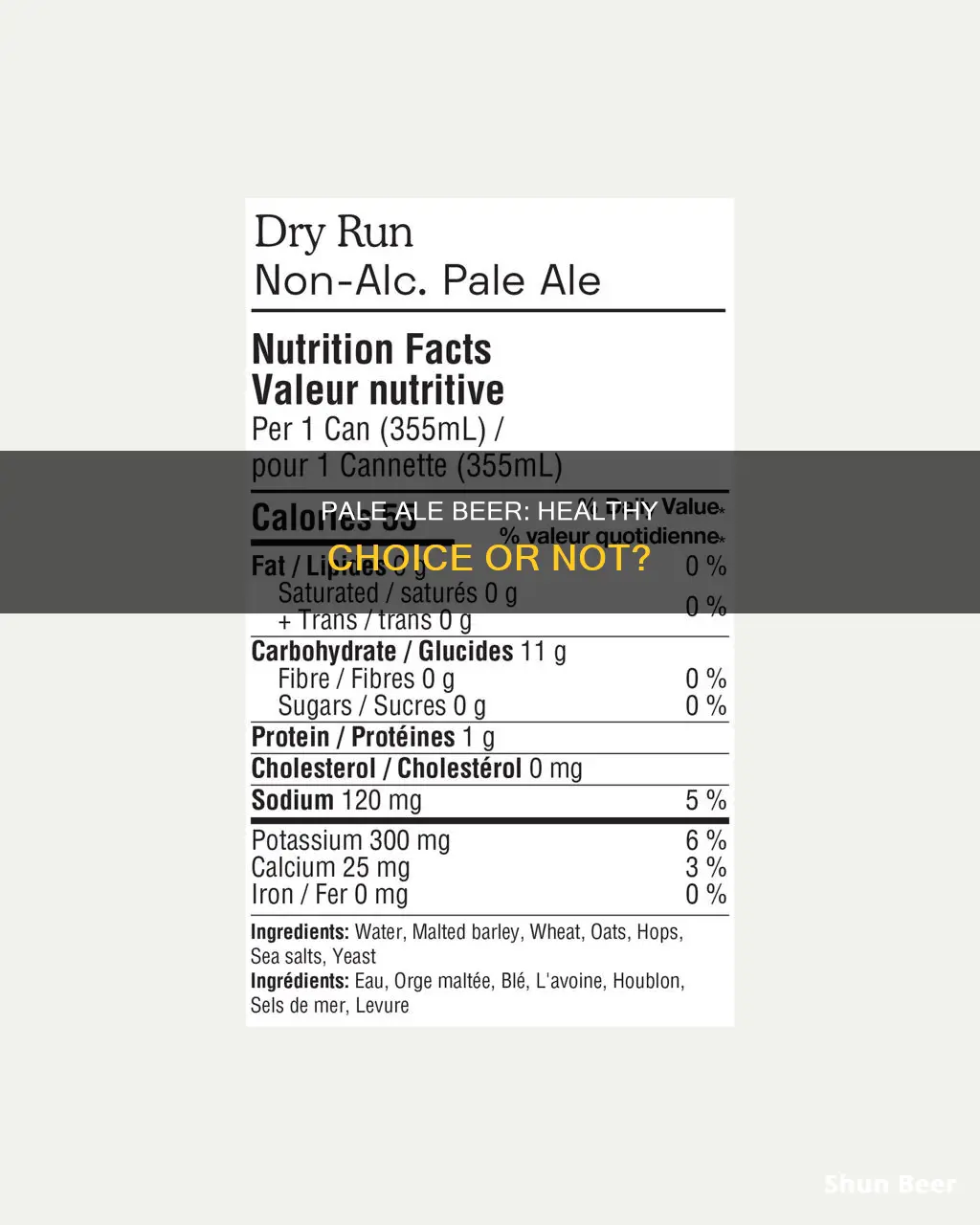
Beer has long been considered to have some health benefits when consumed in moderation. While some of these benefits are anecdotal, there is some scientific evidence to support them. For example, a 2012 study found that women who drank non-alcoholic beer with hops experienced decreased anxiety and better sleep quality. In addition, hops have been used in herbal medicine since before the 1500s, and beer contains vitamins B6 and B12 as well as folic acid. However, it's important to note that excessive beer consumption can lead to negative health effects, including nutrient deficiencies and excess calorie intake.
What You'll Learn
- Pale ales are rich in silicon, which is linked to better bone health
- Drinking beer in moderation can lower the risk of heart attacks and cardiovascular disease
- Beer can be a good source of vitamins B6 and B12, as well as folic acid
- Beer may help reduce the risk of kidney stones due to its high water content
- Beer can be beneficial for skin health when used topically

Pale ales are rich in silicon, which is linked to better bone health
While it is well-known that beer is not exactly a health drink, some beers are better for you than others. For example, non-alcoholic beers are generally healthier than their alcoholic counterparts. However, a recent study has revealed that pale ales, specifically India Pale Ales (IPAs), may have some surprising health benefits.
IPAs are known to be rich in hops, which have been used in herbal medicine since before the 1500s. Hops contain high levels of phytoestrogen, which has been studied for its potential use in preventing certain types of cancers and boosting heart health. Hops have also been used to treat insomnia, depressive symptoms, nervous tension, and anxiety.
Additionally, IPAs are now also known to be rich in silicon, which has been linked to better bone health. A 2010 study by Charles Bamforth and Troy Casey of the University of California, Davis, examined the silicon content in 100 commercial beers. The study found that the beers sampled contained an average of 29.4 mg/L of silicon, with India Pale Ales having the highest levels at an average of 41.2 mg/L.
The study authors wrote that they focused on silicon content because beer has been identified as one of the richest potential sources of dietary silicon in the Western diet. The average intake of silicon in the Western diet is 20 to 50 mg/day. Silicon impacts bone mineral density in humans, and supplementing silicon in the diets of osteoporotic women has been shown to increase bone mineral density. Therefore, the study authors surmise that silicon-rich beer may also help to strengthen bones.
However, it is important to note that the 2010 study did not directly examine the link between beer drinking and bone health. The study authors themselves, as well as other health experts, have cautioned the public against concluding that drinking beer will improve bone health. While moderate alcohol consumption may be linked to higher bone mineral density, heavy drinking can lead to negative consequences for bone health, including an increased risk of osteoporosis and fractures.
Seltzer Beers: Healthy or Just a Fad?
You may want to see also

Drinking beer in moderation can lower the risk of heart attacks and cardiovascular disease
While drinking beer or any alcoholic beverage does not equate to a healthier lifestyle, studies have shown that moderate drinking can lower the risk of heart attacks and cardiovascular disease.
Moderate drinking is defined as an average of one drink per day for women and one to two drinks per day for men. A drink is equivalent to 12 fluid ounces of beer.
Some studies have shown an association between moderate alcohol intake and a lower risk of dying from heart disease. Moderate drinking can help to slightly raise levels of "good" HDL cholesterol. HDL cholesterol helps to remove fatty deposits from within blood vessels, thereby reducing the risk of coronary artery disease. Additionally, moderate drinking can also help to prevent the formation of blood clots in arteries that deliver blood to the heart muscle.
While moderate drinking may increase HDL cholesterol, regular physical activity is a more effective way to do so. Exercise can boost HDL cholesterol levels, and antioxidants—which can also be found in fruits, vegetables, and grape juice—may provide similar benefits to those attributed to red wine.
It's important to note that drinking beer or any alcoholic beverage in excess can lead to negative health outcomes. Excessive drinking can lead to high blood pressure, heart failure, stroke, and cardiomyopathy, a disorder that affects the heart muscle. Alcohol can also contribute to weight gain and obesity, as it is a source of excess calories. Therefore, it is crucial to drink in moderation and not overindulge.
Hoegaarden Beer: Healthy or Harmful?
You may want to see also

Beer can be a good source of vitamins B6 and B12, as well as folic acid
Beer is not exactly a superfood, but it does contain some vitamins and minerals. Beer can be a good source of vitamins B6 and B12, as well as folic acid.
Vitamin B6, also known as pyridoxine, helps the body to use and store energy from protein and carbohydrates in food. It also helps the body to form haemoglobin, the substance in red blood cells that carries oxygen around the body. Good sources of vitamin B6 include poultry, such as chicken or turkey, and some fortified breakfast cereals.
Vitamin B12 is involved in helping the body make red blood cells and keeping the nervous system healthy. It also helps the body to release energy from food. Good sources of vitamin B12 include some fortified breakfast cereals.
Folate is a B vitamin found in many foods. The man-made form of folate is called folic acid. Folate helps the body form healthy red blood cells and can reduce the risk of birth defects called neural tube defects, such as spina bifida, in unborn babies. Good sources of folate include leafy green vegetables, such as cabbage, kale, and spinach, as well as chickpeas and kidney beans.
While beer can provide some vitamins and minerals, it is important to note that drinking too much beer can lead to negative health effects, including excess calorie consumption and nutrient deficiencies. Therefore, beer should be consumed in moderation as part of a balanced diet.
Kombucha Beer: Healthy Beverage or Just Another Fad?
You may want to see also

Beer may help reduce the risk of kidney stones due to its high water content
Beer has long been believed to offer certain health benefits when consumed in moderation. While some of these purported benefits are backed by scientific research, others are not. One such claim is that beer may help reduce the risk of kidney stones.
Kidney stones are hard deposits made of minerals and salts that form inside the kidneys and can affect any part of the urinary tract, from the kidneys to the bladder. They are formed when urine becomes concentrated, allowing minerals to crystallize and stick together. While there is no direct relationship between kidney stones and beer, beer can have indirect effects on the likelihood of developing kidney stones.
Beer is a diuretic, which means it increases urine output. This can be beneficial for passing small kidney stones, as it increases urine volume and aids in stone passage. However, it is important to note that this increased urine flow can also lead to dehydration, which is a risk factor for the formation of new kidney stones. Therefore, while beer may help pass existing stones, it could also increase the risk of developing new ones.
Beer consumption has also been linked to an increased risk of obesity, and being overweight is another factor that can increase the likelihood of developing kidney stones. In addition, beer contains oxalates and purines, which are substances that can contribute to the formation of kidney stones. Beer's high caloric content can further contribute to weight gain, and obesity is a known risk factor for kidney stones.
While some sources suggest that the diuretic effect of beer may help pass small kidney stones, the overall evidence suggests that beer consumption is more likely to increase the risk of kidney stones than reduce it. This is due to the dehydrating effects of alcohol, as well as the presence of oxalates and purines in beer, which are known to induce kidney stones. Therefore, it is important to approach claims about the health benefits of beer with caution and always consult a medical professional for advice.
Healthy Beer Consumption: How Many Monthly Brews Are Safe?
You may want to see also

Beer can be beneficial for skin health when used topically
Beer has been found to have various benefits for skin health when used topically. Beer contains vitamins, minerals, saccharides, and yeast, which make it a natural cleanser. Using beer as a face mask can help reduce acne and pimples, giving the skin a natural glow.
Beer also contains hops, which have anti-inflammatory and anti-anxiety properties. Hops are also used to treat insomnia, depressive symptoms, nervous tension, and anxiety. The malt in beer exfoliates, stabilizes collagen and elastin, improves microcirculation, and prevents premature aging of the skin. The yeast in beer is rich in B vitamins, which help moisturize the skin.
Some of the polyphenols found in beer include kaempferol, quercetin, tyrosol, ferulic acid, xanthohumol, and isoxanthohumol. These compounds have been shown to have anti-bacterial, anti-inflammatory, anti-oxidative, anti-angiogenic, anti-melanogenic, anti-osteoporotic, and anti-carcinogenic effects.
While drinking beer can have some health benefits, it is important to note that excessive consumption can lead to negative health effects, including liver diseases and weight gain. Therefore, moderation is key when it comes to consuming beer.
German vs American Beer: Which is Healthier?
You may want to see also
Frequently asked questions
Pale ales are rich in silicon, a compound linked to better bone health. They also contain higher quantities of polyphenols, which are antioxidant-rich micronutrients that benefit brain and gut health.
Beer contains vitamins B6 and B11 as well as folic acid. It can also help reduce the risk of mental decline for men and women by up to 20%. Moderate consumption of beer can lower the risk of heart disease and heart attacks.
Research suggests that hops in IPAs may help protect your liver from the damaging effects of alcohol.
Some healthy beers include Young Henrys and Afends Hemp IPA, Feral Hop Hog Pale Ale, Yuengling Light Lager, and Sam Adams Light Lager.
While non-alcoholic beers are not considered a superfood, they are generally lower in alcohol, carbs, and calories, making them a healthier option compared to alcoholic beverages.







